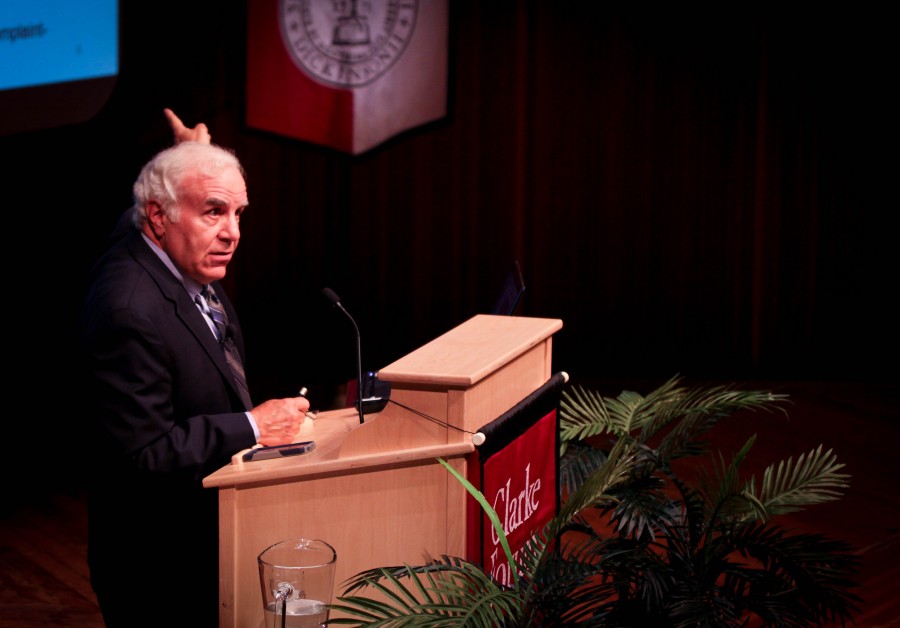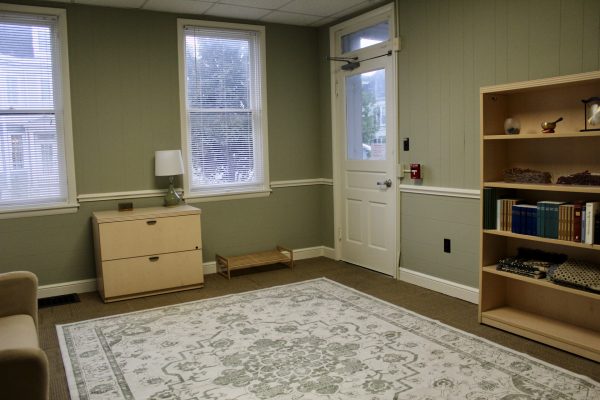Clarke Forum: No Fracking Way
Anthony Ingraffea discusses his research on well fracking and methane emissions on Sept. 16.
Professor Anthony Ingraffea presented his research on well fracking and methane emissions in both the local Pennsylvania area and on a global scale as the first speaker in the Clarke Forum for Contemporary Issues’ Leadership in an Age of Uncertainty Series. Ingraffea, Dwight C. Baum professor of Engineering Emeritus and a Weiss Presidential teaching fellow at Cornell University, explained the repercussions on a community level of having leaky wells and a contamination of water supplies, the global problems of methane emissions and climate change and the implications of these problems for energy policy.
The event was held on Wednesday, Sept. 16 in ATS. It was co-sponsored by the Churchill Fund, Center for Sustainability Education, the Department of Environmental Studies and Alliance for Aquatic Resource Monitoring.
Ingraffea spoke on the industry of well fracking, the method of drilling wells for oil. He explained how destructive the methods of fracking are on the environment, including, but not limited to, methane emissions into the environment and contamination of drinking water. He went on to explain that in actuality, fracking is not even an effective method by which to siphon oil from the earth because it only results in the acquisition of approximately 10 percent of the oil in that area, meaning that the land was destroyed and not even used to its full potential. This makes fracking a “high tech brute force method of getting very limited results,” Ingraffea stated.
Once the wells are in place, there is a high chance that not only will they leak, but also that this problem will be ignored by the fracking industry. Ingraffea showed the audience a video clip of a well that was clearly leaking, followed by the words, “by industry definition, that well is not leaking.” He then explained that unless there is clear and sufficient evidence that proves the well is contaminating an underground source of drinking water, it is not even examined to make sure that there are no leaks.
“Water well contamination is not a thing of the past; it’s a predictable thing of the future,” Ingraffea said, encouraging audience members to take a closer look at the potential destructiveness caused by these conditions and how they can affect our lives, rather than just turn a blind eye as many others do.
Approximately 100 students, faculty and community members attended the event. Julia Martens ’19 was among the students who were particularly affected by Ingraffea’s words.
“I really appreciate the fact that Dickinson works so hard to get relevant speakers for their students to learn from,” Martens said. “As a campus, we’re really environmentally conscious, so to hear about the shale gas pollution in Pennsylvania alone was really eye opening…. It was a reminder to me that even though our campus is working towards being environmentally friendly, there is still a lot of work to be done on a larger scale.”




